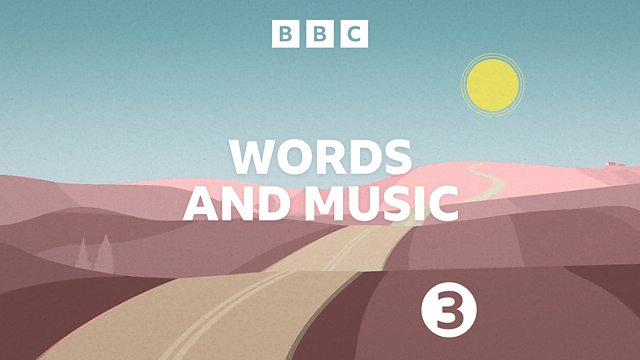
Drumming
Drumming. Mariah Gale and Kobna Holdbrook-Smith celebrate one of the oldest musical arts in readings from Whitman, Housman, Kamau Braithwaite, N Scott Momaday and others, and including music by Copland, Steve Reich, Mahler and Gene Krupa.
Last on
Music Played
Timings (where shown) are from the start of the programme in hours and minutes
-
John Farrar
The Drum read by Mariah Gale
![]() 00:00
00:00Gioachino Rossini
Overture La gazza ladra (excerpt)
Performer: London Classical Players, Roger Norrington (conductor).- EMI CDC 745091-2.
- Tr5.
James Whitcomb Riley
The Drum read by Kobna Holdbrook-Smith
![]() 00:05
00:05Chappie Willett
Jungle Madness
Performer: Gene Krupa’s Swing Band.- PROPERBOX 1.
- CD1 Tr16.
Yusef Komunyakaa
Ode to a Drum read by Kobna Holdbrook-Smith
![]() 00:09
00:09Philip Glass
Concerto Fantasy for 2 Timpanists and Orchestra (excerpt)
Performer: Evelyn Glennie (timpani), Jonathan Haas (timpani), Royal Liverpool Philharmonic, Orchestra, Gerard Schwarz (conductor).- ORANGE MOUNTAIN OMM0014.
- Tr6.
Kamau Braithwaite
The Making of the Drum read by Mariah Gale
![]() 00:14
00:14Alexander Borodin
Polovtsian Dances from Prince Igor (excerpt)
Performer: Berlin Philharmonic, Simon Rattle (conductor).- EMI 517822.
- Tr20.
Richard Leigh
Hearing of a Drum read by Mariah Gale
![]() 00:18
00:18Florence + The Machine
Drumming Song
- UNIVERSAL 2718884.
- Tr1.
Robert Louis Stevenson
Prelude read by Kobna Holdbrook-Smith
![]() 00:22
00:22George Frideric Handel
The Trumpets loud clangour (from An Ode for St Cecilias Day)
Performer: James Gilchrist (tenor), The Kings Consort, Robert King (conductor).- HYPERION CDA67463.
- Tr8.
John Scott of Amwell
The Drum read by Kobna Holdbrook-Smith
![]() 00:27
00:27Gustav Mahler
Der Tambourgsgsell (from Des Knaben Wunderhorn)
Performer: Matthias Goerne (baritone), Royal Concertgebouw Orchestra, Riccardo Chailly (conductor).- EMI 4673482.
- Tr20.
![]() 00:33
00:33Traditional Indian
Raag Bhupal Todi (excerpt)
Performer: Pandit Kamalesh Maitra (tabla tarong), Trilok Gurtu (tabla), Laura Patchen (tanpura).- SMITHSONIAN CDSF40436.
- Tr3.
Thomas Merton
Ariadne read by Mariah Gale
Ancient Chinese translated by Heng Kuan
Ling Tai read by Mariah Gale
![]() 00:39
00:39Sola Akingbola
Kulumba Yeye
Performer: Sola Akingbola and others.- ARC EUCD2114.
- Tr9.
Gabriel Okara
Piano and Drums read by Mariah Gale
![]() 00:44
00:44MG Improvisation
La lluvia
Performer: Rubén González (piano), Amadito Valdés (timbales), and others.- WORLD CIRCUIT WCD060.
- Tr3.
![]() 00:49
00:49Native Flute Ensemble
Flute and Drum Quest
- ARC EUCD2079.
- Tr13.
N. Scott Momaday
House Made of Dawn (excerpt) read by Kobna Holdbrook-Smith
A.E. Housman
On the idle hill of summer read by Kobna Holdbrook-Smith
![]() 00:54
00:54Carl Nielsen
Symphony No. 5 (1st movement, excerpt)
Performer: London Symphony Orchestra, Colin Davis (conductor).- LSO LIVE LSO0694.
- Tr6.
Walt Whitman
Beat! beat! drums! Read by Kobna Holdbrook-Smith
![]() 01:07
01:07Aaron Copland
Fanfare for the Common Man
Performer: Detroit Symphony Orchestra, Antal Dorati (conductor).- DECCA 4142732.
- Tr5.
![]() 01:12
01:12Joseph Haydn
Sonata for piano (H.16.23) in F major, 3rd movement; Finale (Presto)
Performer: Marc-André Hamelin.- Joseph Haydn Piano Sonatas.
- HYPERION.
- 003.
Producer's Note - Drumming
Few forms of musicmaking, except perhaps singing, are as old as drumming. Yet the supposedly simple act of hitting a resounding membrane with a stick or hand to produce a satisfying sound has long been weighted with symbolism and cultural significance. This programme explores some of those loaded meanings, as well as taking time to enjoy the art of drumming – present in so many civilisations – just for its own sake.
In Western cultures the primary association of drums is surely with warfare and the military life. The drum’s role as a recruiting tool and stirrer of the blood – for better or worse – is shown in poems by Stevenson, Housman, James Whitcomb Riley, Richard Leigh and John Scott of Amwell, as well as in Handel’s setting of Dryden’s celebration of the invigorating power of drum and trumpet, and Mahler’s Der Tambourgs’gsell, lamenting the sorry fate of a fallen drummer-boy. But it can also evoke the sheer joy of movement, as in Borodin’s Polovstian Dances, Gene Krupa’s Jungle Madness or in the riotously controlled Cuban timbales-playing of Amadito Valdés. And it can stand for the claustrophobic internal pounding of mental instability, in Florence + the Machine’s Drumming Song or in the devastating side-drum assault of Nielsen’s Fifth Symphony.
In non-Western cultures, drums can signify many other things: in an extract from the native American novelist N. Scott Momaday’s Pulitzer Prize-winning House Made of Dawn, the acquisition of expertise on the drum is a rite of passage; in poems by Gabriel Okara, Thomas Merton and the ancient Chinese poet Ling Tai drums conjure almost hypnotic states of calm sensuality; and both the Nigerian poet Yusef Komunyakaa and the West Indian Kamau Braithwaite explore the symbiotic relationship not only between the drummer and his instrument, but between the drummer and the animal who has died to make his music possible.
We end, however, with a pairing whose contrasting messages seem somehow to complement one another: Walt Whitman’s mighty cry of indignation against the drum’s militaristic bluster; and Aaron Copland’s glorious harnessing of its power for good in echoing and uplifting Fanfare for the Common Man.
Lindsay Kemp
Broadcast
- Sun 25 Oct 2015 17:30����ý Radio 3
The hidden history of plant-based diets
Books website
Get closer to books with in-depth articles, quizzes and our picks from radio & TV.
Gallery



